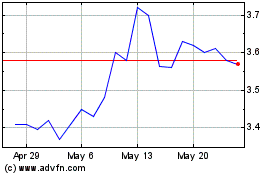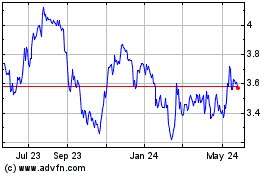Rising Demand for Delivery Is Shifting China's Grocery Landscape -- Update
June 24 2019 - 10:55AM
Dow Jones News
By Julie Wernau
BEIJING -- Carrefour SA, one of Europe's largest grocery
retailers, is unloading most of its operations in China, where
big-box retailers are struggling to keep pace in a market whose
shoppers are turning toward nimble delivery providers.
France's Carrefour, once a dominant force in many Chinese
cities, is the latest Western company to pull back from China as
upstart domestic rivals have been better able to respond to demand.
That trend is compounded in sectors that rely on delivery, where
local competitors have ramped up logistics networks to meet Chinese
expectations for speedy service.
Carrefour is selling an 80% stake in its China business to
Nanjing-based Suning.com Co. for about $700 million.
Delivery is emerging as one of the biggest puzzles facing the
food business globally, with high consumer demand for convenience.
Logistics are tricky, and finding a profitable business model has
been complicated because of the large upfront costs associated with
ubiquitous, convenient locations.
In China, local rivals have snatched market share, complicating
the process for newcomers in the delivery market. To compete,
brands such as Walmart Inc. have either partnered with one of the
domestic titans that largely control the e-commerce space or sold
to their competitors. Earlier this year, Amazon.com Inc. sold its
third-party online marketplace in China to a competitor after years
of declining market share.
Hypermarkets -- stores such as Carrefour whose outlets are
larger than 6,000 square meters -- have been losing market share,
according to Bain & Co., dropping to 20.2% in 2018 from 23.6%
in 2014.
"Vegetables and meat and dairy delivered to your door, that's
the tipping point we're at right now," said Michael Norris,
research and strategy manager at AgencyChina. "The hypermarkets
haven't quite adjusted to these changing dynamics -- that it isn't
necessarily shoppers finding products but products finding
shoppers." Carrefour operates 210 hypermarkets and 24 convenience
stores in 51 Chinese cities.
China has by far the largest online food-delivery market, with
45% of global market share, according to Sanford C. Bernstein. To
compete in the fast-delivery market, the products should be within
3 kilometers, or roughly 2 miles, of the consumer to arrive within
a half-hour of ordering. Hypermarkets' locations on the edges of
cities make that difficult.
Carrefour didn't respond to requests for comment. The stock rose
nearly 1% in late-day trading in Paris.
The deal follows moves by Carrefour in recent years to shore up
its China business, including a partnership last year with Tencent
Holdings Ltd. to benefit from the tech giant's digital expertise.
Carrefour's sales in China fell 5.9% last year to EUR4.1
billion.
Carrefour helped change the retail landscape in China. When the
company entered the country in 1995, it was one of a handful of
Western grocery chains here.
"They've been around for so long, so to invest in e-commerce and
e-commerce logistics and warehouses would be a totally new endeavor
in what is already a very low-margin business," said Ker Zheng, an
e-commerce consultant with Azoya.
Suning shares rose 3.3% Monday to 11.62 yuan a share as the deal
is seen enabling the Chinese retailer to diversify beyond consumer
electronics and appliances. Suning said the partnership would
combine its delivery network and digital strategy with Carrefour's
global supply chain and supermarket-management experience.
In the past few years, direct delivery has become a way of life
for Chinese consumers. Big data and a build-out of logistical
operations have extended this trend to groceries, allowing stores
to plan better and get fresher food items to customers faster.
Retail giants such as JD.com Inc., Alibaba Group Holding Ltd.'s
Tmall and Walmart are experimenting with combining in-store
shopping with e-commerce, while going head-to-head with newer
online-only fresh-grocery providers such as Miss Fresh and Dingdong
Maicai.
At Alibaba's Hema stores, shoppers browse in the same space
where employees fill bags with online orders that are placed on
conveyor belts. At JD.com-backed 7FRESH supermarkets, customers can
inspect produce and peruse other items in person, then use a mobile
app to place their orders for delivery.
By year-end, Walmart said, its more than 400 stores in China
would offer one-hour delivery through its partnership with JD.com.
E-commerce platforms such as Pinduoduo and Taobao, as well as
WeChat, feature farmers live-streaming and selling their goods
directly to consumers.
The grocery race even has retailers snatching up suppliers for
popular products. In April, Tencent-backed JD.com signed a deal
that grants it access to nearly a quarter of Thailand's supply of
durian in a three-year agreement valued at five billion yuan ($728
million). Durian, a tropical fruit famous for its gym-sock stench,
has recently become wildly popular in China.
--Xiao Xiao contributed to this article.
Write to Julie Wernau at Julie.Wernau@wsj.com
(END) Dow Jones Newswires
June 24, 2019 11:40 ET (15:40 GMT)
Copyright (c) 2019 Dow Jones & Company, Inc.
Carrefour (PK) (USOTC:CRRFY)
Historical Stock Chart
From Oct 2024 to Nov 2024

Carrefour (PK) (USOTC:CRRFY)
Historical Stock Chart
From Nov 2023 to Nov 2024
